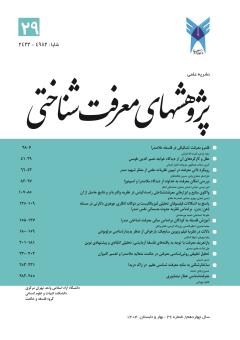پاسخ به اشکالات فیلسوفان تحلیلی فیزیکالیست بر دوگانه انگاری جوهری دکارتی در مسئله ذهن/بدن، بر اساس نظریه حدوث جسمانی نفس صدرا
محورهای موضوعی : پژوهشهای معرفت شناختیعلیرضا اسماعیلی 1 , نعیمه پورمحمدی 2
1 -
2 - دانشیار دانشگاه ادیان و مذاهب
کلید واژه: رابطه نفس و بدن, دوگانه انگاری جوهری, فیزیکالیسم, نظریه حدوث جسمانی, علم النفس ملاصدرا,
چکیده مقاله :
بنابر دیدگاه دوگانه انگاری جوهری دکارتی، انسان متشکل از دو جوهر مستقل و متمایز از هم است: بدن یا ماده فیزیکی که قادر به تفکر نیست و ذات آن امتداد در فضاست، و ذهن/نفس غیر فیزیکی که فاقد امتداد است و ذات آن تفکر یا آگاهی است. در این رویکرد، نفس و بدن در طول زندگی این جهانی چنان به هم پیوند خورده و در هم تنیدهاند که هر کدام از آن دو میتواند بر دیگری اثر بگذارد و در عین حال با مرگ بدن و زوال و فروپاشی آن، نفس همچنان به حیات خود ادامه دهد. هرچند نظریه دکارت در همان زمان خودش نیز با اشکالاتی مواجه شد، اما امروزه و در جامعه فلسفه غرب و از سوی فیلسوفان تحلیلی فیزیکالیست اشکالات متعددی بر آن وارد شده است. از جمله این اشکالات میتوان «معضل لزوم تماس»، «معضل جفت شدن» و معضلی مبتنی بر «اصل بستار علل فیزیکی» را نام برد. این مقاله ضمن تبیین دوگانه انگاری دکارتی و طرح اشکالات مذکور بر دوگانه انگاری جوهری نفس/بدن، به دنبال سنجش سرفصلهایی از علم النفس ملاصدرا و نظریه حدوث جسمانی نفس او برای پاسخگویی به اشکالات وارد شده از سوی فیزیکالیستها بر دوگانه انگاری جوهری است و مدعی است که بر اساس نظریه حدوث جسمانی نفس ملاصدرا و به جای فهم دو جوهری از نفس و بدن، باید این دو را در قالب یک جوهر واحد فهمید که اتحادی جوهری دارند.
According to Cartesian substance dualism, humans are composed of two independent and distinct substances: the body or physical matter, which is incapable of thought and whose essence is spatial extension, and the mind/soul, which is non-physical, lacks extension, and whose essence is thought or consciousness. In this approach, the soul and body are so intertwined during earthly life that each can influence the other. However, with the death and disintegration of the body, the soul continues to exist. Although Descartes' theory faced objections in his own time, it has been subjected to numerous criticisms in contemporary Western philosophy, particularly by analytical physicalist philosophers. These objections include the "problem of necessary contact," the "problem of pairing," and an issue based on the "principle of the closure of physical causes."
This article, while explaining Cartesian dualism and presenting the aforementioned objections to the soul/body substance dualism, seeks to evaluate aspects of Mulla Sadra's psychology and his theory of the corporeal origination of the soul to address the objections raised by physicalists against substance dualism. It argues that, based on Mulla Sadra's theory, instead of understanding the soul and body as two separate substances, they should be understood as a single substance with an essential unity. This research highlights some strengths of Sadra's explanation in confronting physicalist approaches and demonstrates its advantages over substance dualism in explaining the mechanism of the soul-body relationship.
1) دکارت، رنه (۱۳۸۴)، اعتراضات و پاسخ ها، ترجمه و توضیح علی م افضلی، تهران، شرکت انتشارات علمی و فرهنگی
2) ذاکری. مهدی( ۱۳۸۹)، علیت ذهنی، نقد و نظر
3) ریونز کرافت، ایان(۱۳۹۲)، فلسفه ذهن؛ یک راهنمای مقدماتی، حسین شیخ رضایی، تهران، موسسه فرهنگی صراط
4) صبوحی، علی و احمدرضا همتی مقدم(۱۳۹۱)، نظریه های مادی انگارانه ذهن، قم، پژوهشگاه علوم و فرهنگ اسلامی
5) صدرالمتالهین، محمدبن ابراهیم. (۱۳۸۲)، التعلیقات علی الالهیات من الشفا، تصحیح، تحقیق و مقدمه نجفقلی حبیبی، ج۲، تهران، بنیاد حکمت اسلامی صدرا
6) صدرالمتالهین، محمدبن ابراهیم.(۱۳۹۴)، الشواهد الربوبیه فی المناهج السلوکیه، با حواشی حاج ملا هادی سبزواری، قم، موسسه بوستان کتاب
7) صدرالمتالهین، محمدبن ابراهیم.(۱۹۸۱)، الحکمه المتعالیه فی الاسفار العقلیه الاربعه، ج ۱، ۲، ۳، 5، ۸ و 9، بیروت، دار الاحیاء التراث العربی
8) عبودیت، عبدالرسول(۱۳۹۵)، درآمدی به نظام حکمت صدرایی، ج۳، تهران، سمت
9) مسلین، کیت(۱۳۹۱)، درآمدی به فلسفه ذهن، مهدی ذاکری، قم، پژوهشگاه علوم و فرهنگ اسلامی
10) همازاده ابیانه، مهدی(۱۳۹۸)، دوئالیسم سینوی-دکارتی و مونیسم صدرایی از منظر اشکالات فیزیکالیسم، قم، پژوهشگاه حوزه و دانشگاه
11) Bishop, Robert,(2006), The Hidden Premiss in the Causal Argument for Physicalism. Analysis, 76: 44-52
12) Chalmers, D.,(2002), Philosophy of Mind, Classical and Contemporary Readings, Oxford University Press
13) CSM I, II, III : The Philosophical Writing of Descartes, Translated by John Cottingham, Robert Stoothoff & Duglad Muruch(Anthony Kenny, Vol III), Cambridge University Press. First Published, 1984, 1985, 1991
14) Feser,Edward(2006), Philosophy of Mind : A Beginner's Guide, Oneword Publication
15) Foster,J.,(1991), The Immaterial Self: A Defence of the Cartesian Dualist Conception of the Mind. London: Routledge
16) Garber, Daniel (2001), Understanding Intraction: What Descartes Should Have Told Elisabeth, "In Descartes Embodied, 168-188. Cambridge University Press
17) Heil, John(2000), Philosophy of Mind, Contemporary Introduction, London and New York
18) Horst, S, (2007), Beyond Reduction: Philosophy of Mind and Post-Reductionist Philosophy of science, Oxford University Press
19) Hume, David, (1975), Enquiries Concerning Human Understanding and Concerning the Principles of Morals, Edited by Peter Nidditch, Oxford: Claremont Press
20) Kenny, A.,(1968), Descartes, New York: Random Hause
21) Kim, J, (1998), Mind In a Physical Wold, Cambridge, The MIT Press
22) Kim, J.,(2010), Philosophy of Mind, 3th Ed. Westview Press
23) Kim,J,(2018), Against Cartesian Dualism, The Blackwell Companion to Substance Dualism, Edited by: Jonathan J. Loose, Angus J. L. Menage and J. P. Morland, Wiley Blackwell
24) Lowe, E. J,(2000), An Introduction to the Philosophy of Mind. Cambridge: Cambridge University Press.
25) Papineau, David,(2008), The Causal Closure of the Physic and Naturalism. Brain Mac Laughlin


